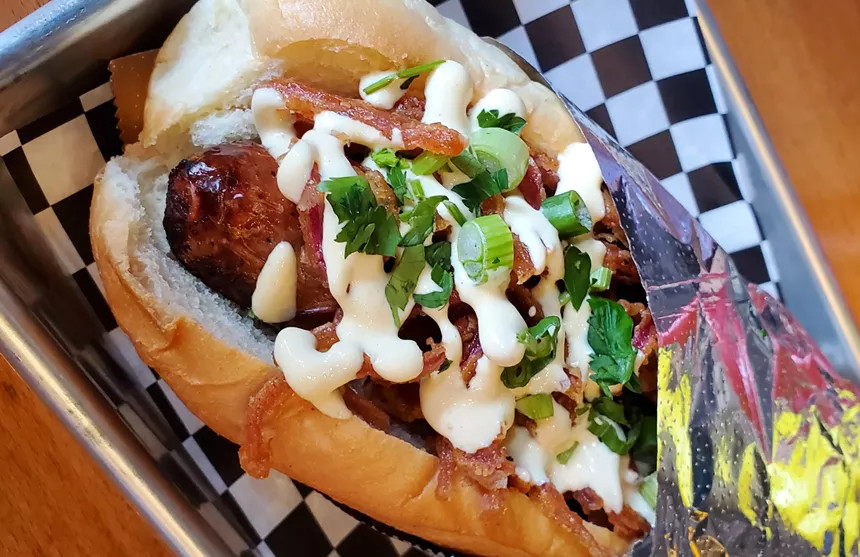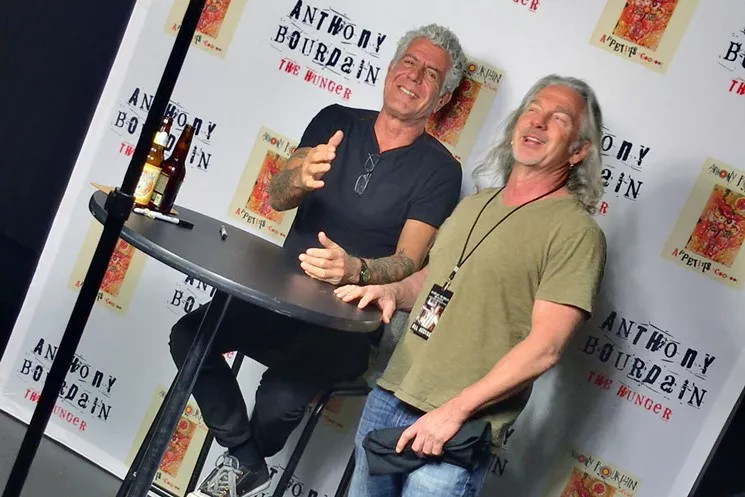On June 17th, a wave of nostalgia and a hint of sadness rippled through Denver’s food scene as Jim Pittenger announced on Facebook his departure from Biker Jim’s Hot Dogs. The news resonated deeply, prompting reflections from food critics like Jason Sheehan, who quipped, “I’m not in the wiener business not to have the jokes,” as he reminisced about the iconic hot dog joint.
It had been a decade, maybe fifteen years, since Biker Jim and Sheehan last spoke. Yet, picking up the phone felt like no time had passed at all. The years melted away as they dove into conversation, catching up as if Jim’s decision to step away from Biker Jim’s Gourmet Dogs was merely a weekend’s worth of news to digest.
Sheehan’s history with Jim Pittenger and Biker Jim’s Hot Dogs stretches back to the very beginning. He witnessed the genesis of a Denver food revolution when Jim rolled out his first hot dog cart near Skyline Park on the 16th Street Mall. This wasn’t just any hot dog stand; it was an audacious declaration of culinary independence, serving up exotic elk sausages and ostrich dogs that challenged Denver’s palate. Sheehan himself was a frequent patron, drawn to the rebellious spirit and unique flavors of rabbit, rattlesnake, and Louisiana red hots, served cash-only to lines of eager customers stretching down the block.
“We were such a band of pirates,” Jim reflected, perfectly encapsulating the atmosphere of Denver’s burgeoning food scene in the early 2000s. It was a time for culinary outlaws, individuals who dared to redefine dining and eating. Denver, in its pursuit of culinary seriousness, had almost forgotten the importance of fun. Biker Jim arrived in 2005 as a much-needed reminder that exceptional meals could be enjoyed standing up, on a street corner. His chrome hot dog cart wasn’t just a food vendor; it was a vanguard of culinary irreverence, paving the way for a wave of unique and unconventional food concepts that would follow.
 a sausage in a bun with various toppings
a sausage in a bun with various toppings
Biker Jim’s Hot Dogs quickly became more than just a place to grab a quick bite; it became a Denver culinary institution. But now, the pirate days are over, or at least, that chapter is closing. The conversation between Sheehan in Philadelphia and Jim in a Denver Lowe’s parking lot sought to uncover the story behind Jim’s Facebook announcement. What went wrong at Biker Jim’s Gourmet Dogs, a business Jim poured a third of his life into? The stark truth: “Biker Jim’s is broke,” Jim confessed, lamenting the loss of his retirement plan. Seventeen years of unwavering financial responsibility, always paying vendors, rent, and payroll, had come to a devastating halt.
The downfall stemmed from a single, ill-fated business deal, a supposed lifeline offered during the darkest days of the pandemic. What appeared to be salvation turned into an anchor. “Two thousand twenty,” Jim uttered, the year evoking a palpable shudder. The pandemic year was brutal. Shutdowns, occupancy restrictions, deserted streets—it was a perfect storm for the restaurant industry. Jim exhausted his emergency funds, then his savings, finding himself in a seemingly inescapable financial abyss.
In desperation, he entrusted Biker Jim’s to someone promising millions and making grand promises, all of which proved to be fabrications. The decline was gradual at first, then accelerated into a rapid descent. Seventeen years of dedicated building were undone in a mere two years, culminating in a business nosedive that made headlines and prompted concerned calls from old friends wanting to understand the unraveling.
Anthony Bourdain with Biker Jim Pittenger, a meeting that shifted Bourdain’s perspective on Denver’s culinary scene.
Despite the recent hardship, Jim can still laugh, recalling, “I had delusions of adequacy.” His journey with Biker Jim’s Hot Dogs was undeniably epic. From humble beginnings with a cart, he expanded to Coors Field, Red Rocks, and a brick-and-mortar restaurant on Larimer Street. He famously served Anthony Bourdain, contributing to a shift in Bourdain’s perception of Denver as a culinary destination. Biker Jim even reached the prestigious James Beard House, serving polenta in marrow bones to culinary elites. Yet, the present reality is starkly different. “It isn’t the same,” Jim admitted, expressing disappointment in how his staff and partners have been treated. The current state of Biker Jim’s no longer aligns with his vision. Hence, his resolute decision: “Fuck y’all. I’m outta here.”
The pandemic’s impact on the restaurant industry will cast a long shadow, becoming a recurring ghost story for years to come. The industry will forever be divided into pre-COVID and post-COVID eras. Biker Jim’s, in many ways, represents a pre-COVID success story. Jim Pittenger embodies the spirit of seizing the moment, running with it, and taking everyone along for a thrilling ride. Their conversation meandered through cherished memories: summer days, ayahuasca retreats, stolen recipes, reindeer dogs, and the encounter with Anthony Bourdain.
“More than anything, I love feeding people,” Jim stated, revealing his core passion. Amidst the closure of Biker Jim’s Hot Dogs as it was known, there’s a glimmer of hope. Biker Jim Pittenger’s story might not be over. While Biker Jim’s may be a shadow of its former self, Jim himself is not defeated. Older, perhaps, but also wiser and resilient. He began as a culinary outlaw, and that spirit remains. Having built something from nothing once, he believes he can do it again, returning to the streets, slinging hot dogs, reigniting the magic of the early days.
Second acts are challenging, and the Denver landscape has evolved. However, there’s a desire to believe in the possibility of a comeback. In the pantheon of Denver’s culinary history, Biker Jim Pittenger deserves a prominent place. The hope is that someday, patrons might find Jim Pittenger back in action, perhaps in a parking lot, still serving up his legendary hot dogs with his signature rebellious flair.

 two men posing together
two men posing together 
